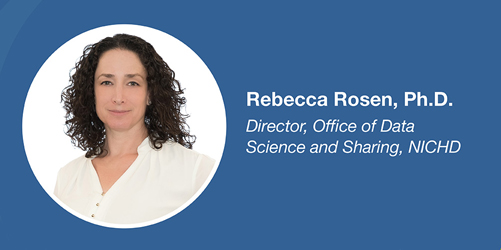 What do you do at NICHD?
What do you do at NICHD?
I’m the director of NICHD’s Office of Data Science and Sharing (ODSS). ODSS was established in July 2021 as an activity under the NICHD Strategic Plan 2020 as part of the institute’s scientific stewardship goal of facilitating data sharing and access to biospecimens.
ODSS was established to lead and coordinate NICHD’s activities within data science, bioinformatics, data sharing policy and compliance, and emerging technologies.
What types of training, experiences, or traits are essential for success in your position?
The ODSS vision is to enable a culture of responsible and innovative use of data and biospecimens that accelerates research and improves health for NICHD populations. To achieve this vision, we must work with and listen to all NICHD communities: our staff, our intramural and extramural researchers, and an array of external stakeholders. This requires expertise in communications, stakeholder engagement, and program and project management. ODSS is learning from these communities what technology and training they need to best utilize NICHD data and biospecimens. We are then translating their feedback into development plans for the NICHD Data Ecosystem. This type of work requires product management expertise. However, most important for success in my position is the ODSS team!
What do you find most valuable about working at NICHD?
NICHD’s most valuable asset is our people. Our staff are incredibly intelligent and dedicated to the NICHD mission. As a leader within the Office of the Director who serves the entire institute, NICHD’s people provide the most value to my job.
Describe a project or task that you are especially proud of accomplishing.
In the fall of 2021, the ODSS team received funding from the NIH Office of Data Science Strategy to research an approach to connecting pediatric COVID-19 datasets generated from multiple research studies. These datasets were being shared in different NIH data repositories and connecting the datasets would create richer information about the children in the datasets and support new research questions. Because the data are deidentified before sharing, connecting the data requires special technology and governance frameworks. We researched how other groups have solved this data connection challenge and developed considerations specific to the pediatric COVID-19 situation. Our findings were reported to NIH leadership and will form the basis of future NIH decisions on this topic. We’ve also secured additional funding from the HHS Patient Centered Outcomes Research Trust Fund to further explore the pediatric data linkage topic in partnership with other HHS organizations that host pediatric health outcomes-related datasets.
What advice can you offer to people who are at an earlier stage of their career?
Explore opportunities within NICHD and with colleagues across NIH and be willing to step a bit outside your comfort zone. NIH has an incredibly rich set of training resources for all different types of staff and career ambitions. Seek out a mentor (or two) to help guide you along your career path.
Return to Get to Know NICHD.
 BACK TO TOP
BACK TO TOP